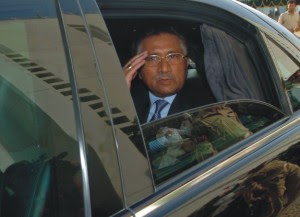
THERE was no electricity at our place in Karachi this afternoon, but it was cool so we hadn't turned on our little generator. "Aren't you watching our president's speech on TV?" asked a friend on the phone. On came the generator. Live on Geo, the TV channel that spearheaded the media boom under Musharraf, was the president in a dark western suit and tie (rather than the high-collared sherwani that leaders tend to don when trying to appease nationalist or religious forces).The obligatory portrait of the country's founder (sherwani-clad) on the wall behind him, Musharraf was listing his government's achievements.The economic achievements are tempered by rising inflation and increasing divide between the rich and poor, but he made a couple of good moves when he restored the women's reserved seats in parliament and introduced thirty percent women's seats at the district level, as well as striking down the "separate electorate system" that divided voters on religious grounds. Reminding people that he was a human being, prone to making mistakes, whose intentions were always noble, he thanked his mother, his wife, and his children for always standing by him.And then he did what no leader in Pakistan has ever done: publicly announced his resignation -- something he should have done a long time ago. The elections of February 18 provided a good opportunity but the tenacious former army commando had dug his heels in and refused to go, despite his earlier promise to step down if the people rejected the parties that supported him.America is perceived as one of the major factors keeping him in place, as a key ally in the "war on terror." Washington has now started realising the need to back the people of Pakistan and the elected government rather than an un-elected president and the army.The "war on terror" cannot be won by military means alone. It is important to support the political process and take the people along.In resigning, Musharraf avoided the impeachment that loomed over his head (another first), which would have carried confrontation further. As I left on August 12 for Jakarta to participate in a forum on "Islam and Democracy in South Asia," someone remarked that I would be returning in five days to a transformed Pakistan. Not likely, I replied. Even if Musharraf went during this time, there would be no dramatic change. Inflation would continue to break the people's backs, violence in the name of religion would continue to take lives, unprincipled forces would continue to try and sabotage the democratically elected government, hidden hands would continue to needle India and Afghanistan, and the lawyers would continue to agitate for restoring the judiciary that Musharraf had axed during his imposition of emergency on November 3 last year, that the ruling coalition is dragging its feet over.As Musharraf announced his resignation, television news showed jubilant men and women dancing in the streets of Multan (Prime Minister Yusuf Raza Gillani's hometown). Some called for Musharraf to be held accountable and charged with treason, punishable by death. Wisdom would call for another course of action that provides Musharraf safety and "leave his accountability to history … (which) is necessary for the stability of the country and for moving forward," as political analyst Shaheryar Azhar puts it.The nation seems to have heaved a collective sigh of relief that the drama is finally over. But Musharraf's departure is just one step in the process of democracy, for the continuation of which Pakistan and its allies will need all the patience they can muster.


No comments:
Post a Comment